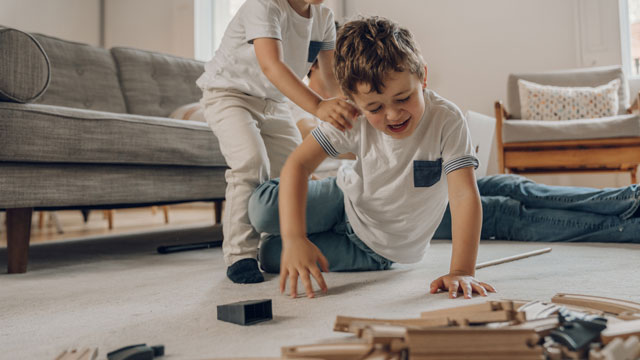Here’s something they don’t tell you about being a parent: Someday you’ll be in the front seat of your car spitting out idle threats while your kids scuffle over something as small as a one-and-a-half calorie breath mint. But there I was, with my boys in full melee mode while I unsuccessfully tried to quell the conflict between siblings.
According to this ABC News report, young siblings argue an average of 3.5 times an hour—up to ten minutes every hour. In addition, siblings make 700 percent more negative and controlling statements to each other than they do to friends, the report said.
Parent coach Abigail Wald, who has helped more than 10,000 families through her nontraditional parent coaching program, says, “Essentially, all of these experiences are good training wheel dramas for everything that our children are going to have to deal with throughout their lives.”
Whether you’re trying to referee your toddlers or help tweens learn how to be patient with younger siblings, there are a lot of times we as parents have to step in—and other times we need to sit back and let our kids handle things on their own. But how do you know when to do what? We talked with experts to find out what parents should do when kids fight. Here’s what we found out:
Related: How to Resolve Sibling Rivalry
What to Do When Kids Fight: Sibling Drama
Let’s face it: If your kids are actual human children, they’re bound to argue. So should you make like a hockey ump and squeeze yourself between them? Or should you step back and let them work it out on their own?
The answer might be somewhere in between, said California psychologist Dawn Huebner.
You see, it’s not always about ending the fight; it’s about giving them the skills—like listening, taking turns, and compromising—they need to solve the problem. According to Huebner, who is the author of several books, including The Sibling Survival Guide: Surefire Ways to Solve Conflicts, Reduce Rivalry, and Have More Fun with your Brothers and Sisters, “A lot of parents think either you get involved as a referee or you just leave them alone to sort things out. But there’s actually a middle ground that’s the most effective: Getting involved, not to solve the problem but to coach your kids to solve the problem.”
Related: 6 Ways to Build Unbreakable Sibling Bonds
Here are some scenarios to consider:

When they’re fighting over a toy
When you see your kids fighting over a particular thing (because face it: they’ll always want the same toy, right?), try to help them figure out how to take turns (Hint: Always do this when you’re standing in front of them, not yelling from the kitchen across the room.)
For younger kids, you can try a “toy timer” that lets them know when to take turns. This can be as simple as watching the clock or setting a timer on your phone. For older kids, you can ask them to suggest solutions that would work for both sides.
“It’s not so much that you’re proposing negotiations, but you want to be asking questions that help them figure out how to work it out. The goal is to help them learn how to listen to one another and how to make compromises among themselves,” Huebner said.
And while it may seem like getting rid of the toy in question is the easiest solution—especially when you are tired of trying to intervene—Wald said that’s the worst thing a parent can do. “Because then everybody is pissy and blames everybody else.”
When they’re fighting over screen time
Before you start watching TV or online games, do the pre-work. Talk to your kids about what they think is fair: Could they take turns with their TV shows? Could they have a timer set and trade when it goes off? Younger kids may need more involvement in sticking to these rules, but no matter the age, it’s best to set the parameters before kids start watching TV or playing video games.
When they’re fighting about privacy
If your older child loses his cool every time his younger siblings barge into his room, find a time to have a discussion about how to give the younger sib a 10-minute “time slot” that both kids are OK with—or, make door signs that can tell outsiders when it is OK and NOT OK to come into the room (or bathroom).
When they’re fighting about the same thing (again)
Do your kids fight every time they get into the car? Is there a brawl every time it’s family movie night? It’s time for some pre-work! For instance, decide on a “seat schedule” to dictate who gets to sit in a particular seat/row in the car, or set a schedule for who chooses the family movie every week.
“When something happens over and over again, that tells you that you need to help your kids come up with some plan about it when it’s not happening. You need to talk to them in advance and come up with a solution together that you can both live with,” Huebner said.
When the fight turns physical
If you sense an argument is headed for blows (or if it already has), step in between your children and physically separate them. According to Huebner, the best course of action is to “Say something like, ‘Whoa, whoa, whoa—Things are getting really heated here,” “You want your initial comment to be about the situation; not the child. You’re not blaming anyone.”
Then, explain to your kids that they need to calm down before they can talk (this usually means keeping them physically apart for a few minutes). And don’t try to decode the issue until that happens.
“When kids are in a heightened state—when they’re yelling at each other—it literally means they don’t have access to their prefrontal cortex, the thinking part of the brain.”
When it seems like they’re always fighting
If you feel like your kids are constantly at each other, try to rewrite the narrative by focusing on the positive. In this article by the Child Mind Institute, psychologist Stephanie Lee proposed a genius way to do this: by encouraging kids to “Tootle” instead of tattle.
Tootling, the article explains, is calling out positive behavior. So, have your kids tell you when a sibling does something nice, like sharing. You can even put a coin in a “Tootle Jar” to celebrate these moments; that way your kids are noticing (and, hopefully, striving for) the positive moments rather than brewing in the bad times.
“For every time you catch them fighting, you want to catch them playing nicely together three to five more times. “We want to encourage that in order to really change their behavior,” Lee said in the article.
Related: This Mom’s Hilarious Viral Video About Sibling Fights is On Point











